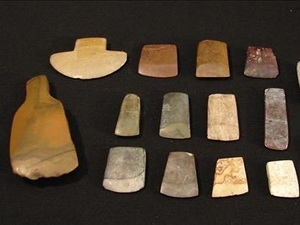Archaeologists have found a tomb containing the remains of a man who was believed to live in the period of Phung Nguyen culture about 3,500 years ago, at the Dong Dau relic site in the northern province of Vinh Phuc.
 According to Nguyen Lan Cuong, Deputy General Secretary of the Vietnam Association of Archaeology (VAA), the remains were unearthed during an excavation jointly conducted since last December by the VAA, the History Faculty of the University of Social Sciences and Humanity and the Vinh Phuc provincial Department of Culture, Sports and Tourism.
According to Nguyen Lan Cuong, Deputy General Secretary of the Vietnam Association of Archaeology (VAA), the remains were unearthed during an excavation jointly conducted since last December by the VAA, the History Faculty of the University of Social Sciences and Humanity and the Vinh Phuc provincial Department of Culture, Sports and Tourism.
The remains, believed to be of a man 1.6m tall, will be sent to the province's museum for more research and preservation.
Many other artifacts such as stone axes and graters, bronze arrows, ceramics and jewellery made of stone, animal horns and bones have also been found during this evacuation. Scientists dated them back to the Dong Dau, Go Mun and Phung Nguyen cultures.
Dong Dau relic site is one of the largest excavation sites in the country, where numerous artifacts of the four cultures during the time of Hung Kings, have been found.
Based on their findings, archaeologists thought the eastern area of the Dong Dau relic site was the living place of ancient Vietnamese people in the Phung Nguyen period while most of the tombs were found in the southwestern area.